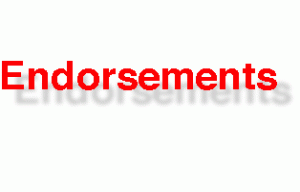Among your many professional and business contacts, who loves you and your work enough to recommend you to their clients and customers?
Not just when their clients or customers or business contacts mention a legal issue or question or ask for a referral–immediately, without being asked?
Who loves you enough to go out of their way to send a letter to all of their clients and contacts telling them that they recommend you wholeheartedly, and why? Who loves you enough to tell the people in their world to hire you, sign up for your newsletter or seminar, or download your report?
Who loves you enough to endorse you?
Endorsements (from the right people) give you instant credibility and can instantly bring you new business and new opportunities. If the endorser has even a small list of people who trust and respect them, their endorsement can cause your list, your following, and your practice to blow up.
You get testimonials and positive reviews from your satisfied clients that convince prospective clients that you are “the one”. Endorsements can do much more.
Endorsements can introduce your name and capabilities to legions of people who don’t know who you are and don’t know they need you. They can open doors to speaking and networking opportunities. They can help you meet key people in your market that bring you scores of new clients and better clients.
Endorsements are marketing gold. And you should do everything you can to earn them.








